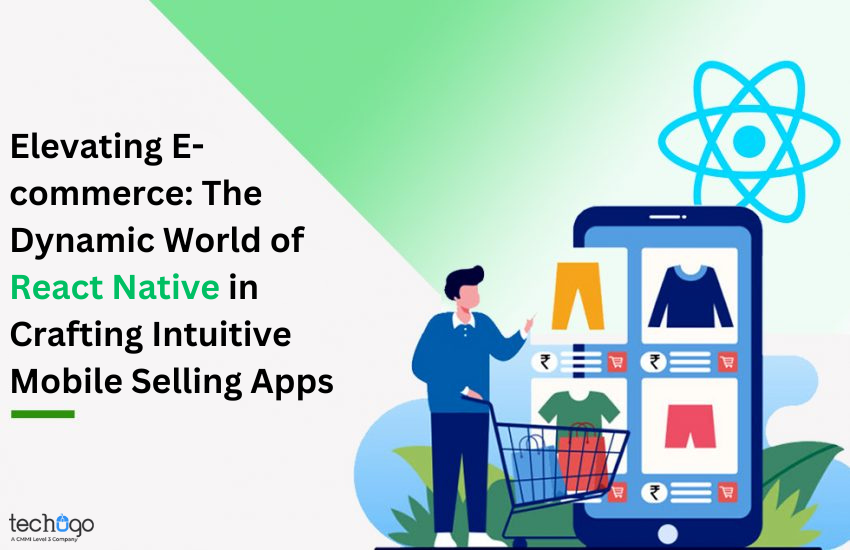
Elevating E-commerce: The Dynamic World of React Native in Crafting Intuitive Mobile Selling Apps
In the rapidly evolving sphere of mobile app development, selecting a framework holds the key to unlocking the potential of applications. React Native, a versatile cross-platform framework has emerged as a frontrunner, empowering developers to create high-performance mobile apps efficiently. This blog embarks on a journey through the realm of a React Native app development company, specifically focusing on its application in creating top-tier mobile apps. Additionally, we’ll delve into a comparative analysis with Flutter, another influential framework, and explore the distinctive features that position React Native as the preferred choice for businesses venturing into the realm of robust mobile presence.
The Ascent of React Native in Mobile App Development
Developed by Facebook, React Native has been widespread due to its capacity to facilitate app development across iOS and Android platforms; by harnessing a single codebase, a mobile app development company in Dubai can engineer applications that simulate a native experience, optimizing development timelines and conserving valuable resources. Built on the foundations of React, a JavaScript library for crafting user interfaces, React Native is designed to be accessible to an extensive spectrum of developers.
Mobile Selling Apps: Pioneering the E-commerce Landscape
In the vibrant e-commerce landscape, mobile selling apps have evolved indispensable for enterprises aiming to tap into the ever-expanding market of online shoppers. These applications provide a suitable platform for users to explore products, make secure transactions, and engage in a seamless shopping experience. The escalating demand for feature-rich and user-friendly mobile selling apps has prompted businesses to seek robust frameworks capable of delivering on these expectations.
A Comparative Analysis: React Native vs. Flutter in Mobile App Development
Now let’s delve into the analysis of Flutter vs React Native and what it provides while building apps:
Flutter: A Challenger in Cross-Platform Prowess
Flutter, an offering from Google, is another cross-platform framework that has garnered attention for its expressive UI and efficient performance. Enabling developers to create visually captivating applications with a single codebase, Flutter has its merits. However, the choice between React Native and Flutter typically hinges on a project’s specific requirements and the development team’s preferences.
React Native: The Apex of Cross-Platform Development
React Native distinguishes itself through its flexibility, robust community support, and seamless integration capabilities with existing native code. Offering developers the ability to achieve near-native performance, the framework ensures a fluid user experience across diverse devices. Its modular architecture, hot-reloading feature, and extensive library support contribute to its popularity among developers.
Features Propelling React Native to Excellence in Mobile Selling Apps
Now, let’s discuss the propelling features that React Native provides in building mobile selling apps. Here are some of the innovative features of React Native:
Cross-Platform Compatibility:
- React Native’s standout feature is its capacity to incorporate code once and deploy it across multiple platforms. This expedites the development process and ensures an innovative user experience on iOS and Android devices.
Near-Native Performance:
- Achieving performance akin to native applications, React Native utilizes native components, resulting in swift load times and seamless interactions. In the realm of mobile selling apps, where responsiveness and speed are paramount, this feature is of unparalleled importance.
Reusable Code Components:
- The component-based architecture of React Native encourages the reuse of code components, amplifying development efficiency. This modular approach simplifies maintenance and updates, fostering a more agile and streamlined development process.
Hot-Reloading:
- React Native’s hot-reloading feature permits developers to witness the immediate impact of code changes during the development phase. This accelerates the debugging and iteration, facilitating a more dynamic and efficient development cycle.
Third-Party Plugin Integration:
- The vast ecosystem of third-party plugins and libraries surrounding React Native allows developers to integrate many features seamlessly. For mobile selling apps, this translates to easy integration of payment gateways, social media logins, and other indispensable functionalities.
Community Support:
- React Native boasts a robust community that provides resources, documentation, and community-contributed modules. Developers can leverage this support to troubleshoot issues, stay updated on best practices, and accelerate the learning curve.
Navigating the Creation of Seamless Mobile Apps with React Native
Intuitive User Interfaces:
React Native supports coders to build user interfaces that are intuitive and visually appealing. Its declarative syntax and extensive styling options facilitate the design of interfaces that align with the brand identity, providing users with a delightful and immersive shopping experience.
Real-Time Updates:
Mobile selling apps often require real-time product availability, pricing, and promotions updates. React Native’s seamless integration with backend services and APIs enables developers to implement real-time features, ensuring users can access the latest information at their fingertips.
Secure Transactions:
Security is paramount in mobile selling apps, particularly concerning financial transactions. React Native supports the integration of secure payment gateways and encryption protocols, providing a robust framework for building apps that prioritize the protection of user data.
Scalability:
React Native’s scalability allows apps to evolve alongside the growth of businesses. As demands increase, both in terms of features and user base, React Native ensures that apps can expand without compromising performance, adapting seamlessly to changing requirements.
Conclusion
In Conclusion: Shaping Tomorrow’s Mobile Selling Experience
In the competitive mobile app development arena, A React Native app development company is a formidable choice for crafting high-performance mobile selling apps. Its ability to seamlessly provide a cross-platform experience and features that enhance development efficiency and user satisfaction positions it as a leading solution.
As businesses in the e-commerce sector continue to prioritize mobile app development, the choice of the proper framework becomes a strategic decision. React Native, with its adaptability and expansive community support, emerges as a robust solution for those aiming to create mobile selling apps that not only meet but surpass user expectations. The future of mobile app development, particularly in the realm of e-commerce, is undeniably shaped by frameworks like React Native, paving the way for innovative, user-centric, and feature-rich applications that redefine the e-commerce landscape.